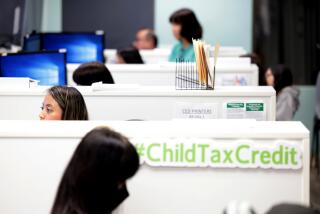Furor Over Paying Domestic Help Seems to Hit Home : Law: Internal Revenue Service offices report a surge in private citizens seeking tax information and forms for workers.
- Share via
WASHINGTON — At the Internal Revenue Service office in San Francisco, two people have been added to the team that answers inquiries about the wage taxes employers must pay for household workers.
In the downtown Chicago office, IRS employees have noticed a marked increase in demand for 942 Forms--the documents employers must file to pay the taxes.
And at the IRS office in Seattle, copies of a publication explaining the law that requires employers to pay Social Security taxes on the wages of maids, baby-sitters and other household employees earning more than $50 a quarter were disappearing faster than they could be put out.
The controversy over whether Clinton Administration appointees--and other high-ranking officials--have deliberately or inadvertently failed to pay wage taxes for domestic workers appears to have stirred Americans who either had dodged the taxes or were ignorant of the law.
“People are more aware of their obligation now because of the attention to these issues in the media,” said Larry Wright, a public affairs officer at the IRS in San Francisco. To meet the growing demand for information, his office has increased from three to five the number of people who answer questions at its phone bank.
Although IRS headquarters in Washington is not tracking the trend, officials in district offices around the country said they have seen evidence that Americans who were violating the tax law are at least thinking about obeying it.
In recent weeks, radio and television talk shows, newspapers and news magazines have been replete with stories about Zoe Baird, the attorney general-designate who lost her chance to join the Clinton Cabinet because she employed illegal immigrants as domestic workers and failed to pay their wage taxes. The ensuing brouhaha doomed another potential attorney general, federal Judge Kimba M. Wood--who had not even broken the law--then swept over Commerce Secretary Ronald H. Brown, when he admitted failing to pay taxes for his housekeeper.
Members of Congress also are being pressed to answer questions about their domestic help. Sen. Bob Graham (D-Fla.) said that he will pay the IRS $375 in back taxes, interest and penalties for unwittingly failing to pay the Social Security taxes for a woman who earned $2,000 to clean his house over a two-year period. Rep. Jon Kyl (R-Ariz.) told the Arizona Republic newspaper that he has begun paying the taxes for part-time housekeepers this year now that he knows they are required.
Among many though, including high-ranking officials in Washington, confusion still flourishes. A senior attorney at the Justice Department in Washington said Tuesday that he wonders whether he should have paid taxes for a twice-a-month housekeeper. “I read the law at the time and decided that I didn’t have to file but now I’m not sure,” said the career prosecutor. “There are a lot of people here in the same boat. Do you have to file for the kid who mows the lawn if you pay him more than $50 a quarter?”
Bill Rivkin, a spokesman for the IRS district office in Chicago, attributed the surge in interest in employer taxes to a mixture of people who were unaware of the tax, those who had simply procrastinated in paying it, others who had deliberately broken the law to save money and still others who are thinking of hiring a maid or nanny.
Rivkin said that the tax form for employers of household help have been in demand especially since the Baird controversy. But he said that there was a marked increase Tuesday, after news spread about Brown.
Judy Monahan, public affairs specialist for the IRS in Seattle, said that she had not detected an increase in calls to her office but had noticed that more people than normal were walking into the central IRS office in her city to pick up publications explaining the law.
The law, written in 1954, requires employers to pay Social Security taxes and sometimes other taxes for household workers paid more than $50 for each three-month period.
Failure to pay these taxes means that employees may not be eligible to collect Social Security, Medicare, Medicaid or unemployment benefits that they might otherwise receive.
In cases of delinquency, employers are responsible for paying back taxes, plus interest, and may be subject to fines of up to 48% of the total tax, IRS officials said. The IRS is more lenient with violators who come forward themselves, officials said.
The 1992 Social Security tax rate for both employees and employers is 7.65%, half paid by the employer and half by the employee. An employer who is delinquent may be responsible for paying both shares.
The law does not apply to all workers who perform services in a person’s home. Some are considered independent contractors.
Rules for Employing Workers in Your Home
Here are tax requirements for hiring maids, baby-sitters and other domestic employees:
Social Security taxes must be paid if an employee earns at least $50 in a quarter. The cost can be split between worker and employer, but many employers choose to pay the entire amount.
Employers must file Internal Revenue Service Form 942 with the quarterly payments. In addition, they must file W-2 forms at the end of each year.
If employers pay $1,000 or more in a quarter to all household workers, they must also file and pay federal unemployment tax.
The taxes need only be paid for employees, not for independent contractors. An example of a contractor would be a plumber who provides his or her own tools and is paid by the job, not by the hour. An example of an employee would be a baby-sitter who brings no tools to the job, is paid by the hour and is given specific instructions on how to do the job.
Source: Times wire reports
More to Read
Get the L.A. Times Politics newsletter
Deeply reported insights into legislation, politics and policy from Sacramento, Washington and beyond. In your inbox three times per week.
You may occasionally receive promotional content from the Los Angeles Times.










